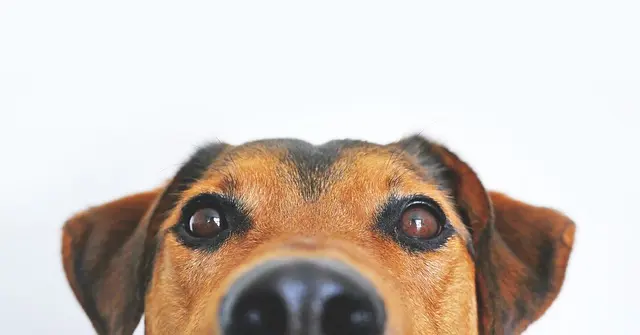Wondering if can melatonin make dog eye swell? While melatonin is widely used to manage anxiety, sleep issues, and other conditions in dogs, some pet owners have reported side effects like eye swelling. This uncommon reaction could result from allergies, sensitivities, or underlying conditions.
In this article, we’ll explore whether melatonin can cause eye swelling in dogs, potential reasons behind it, and what steps you can take to ensure your pet’s safety. Keep reading to learn how to use melatonin responsibly and protect your furry friend’s health.
What Is Melatonin and Why is It Used for Dogs?
In veterinary medicine, melatonin is commonly used as a supplement to help dogs manage a variety of issues, from anxiety and phobias to sleep disturbances.
It works by promoting a sense of calmness and relaxation, making it especially useful for dogs experiencing stress due to thunderstorms, fireworks, or separation anxiety. Melatonin is also available in forms like tablets, liquids, or chews, making it easy for pet owners to incorporate into their dog’s routine.
Beyond behavioral and sleep-related benefits, melatonin is used to address other health concerns in dogs. For instance, it can help manage conditions like seasonal alopecia (hair loss) and Cushing’s disease by supporting hormonal balance. In aging dogs, melatonin may improve disrupted sleep patterns, enhancing their overall quality of life.
Its natural composition and general safety make it a popular choice among pet owners seeking an alternative to pharmaceutical solutions. However, like any supplement, it’s important to use melatonin under veterinary guidance to avoid potential side effects or complications.
Can melatonin make Dog eye swell?

Although melatonin is generally safe for dogs, it can occasionally cause side effects. Melatonin make dog eye swell. Eye swelling is not a common reaction to melatonin, but it may occur in some dogs due to allergic reactions or sensitivities. This section dives into the possible reasons why melatonin might make a dog’s eye swell and what pet owners should watch for.
Allergic Reaction to Melatonin
Just like humans, dogs can develop allergies to certain substances, including melatonin or its components. An allergic reaction may present as swelling around the eyes or face, accompanied by redness, irritation, or itchiness.
Other signs may include watery eyes and general discomfort. These symptoms indicate the immune system’s response to the allergen, signaling that melatonin may not be suitable for your dog. If you observe such reactions, discontinue the supplement immediately and consult your veterinarian for appropriate care.
Sensitivity to Inactive Ingredients
Some melatonin products contain additives like artificial flavors, preservatives, or fillers, which may cause adverse reactions in sensitive dogs. These inactive ingredients, rather than the melatonin itself, could be the trigger behind eye swelling or irritation.
Dogs with sensitivities may experience discomfort such as redness, itching, or puffiness in the eye area. Choosing a high-quality, pet-specific melatonin product with minimal additives can help reduce these risks. If symptoms persist, consult a veterinarian to rule out sensitivities or allergies.
Underlying Health Conditions
Eye swelling in dogs taking melatonin might not always be directly caused by the supplement. Instead, the swelling could be linked to an underlying condition such as conjunctivitis, an eye injury, or an infection. In some cases, melatonin might exacerbate these conditions by influencing immune or inflammatory responses.
It’s crucial to identify and address the root cause, as untreated conditions can worsen over time. A veterinary examination is essential to determine the true cause of the swelling and ensure appropriate treatment.
Signs to Watch for If Your Dog’s Eye Swells

When a dog’s eye swells, it’s important to identify accompanying symptoms to determine the severity of the issue. Initial signs often include visible puffiness around one or both eyes, redness, and watery discharge.
Your dog may paw or scratch at their face, indicating discomfort or irritation. Squinting or sensitivity to light can also be clues that something is wrong. While these symptoms might suggest an allergic reaction to melatonin, they can also indicate unrelated conditions like conjunctivitis or an eye injury, requiring close observation.
In more severe cases, additional symptoms may appear, signaling the need for urgent veterinary care. These could include persistent swelling that worsens over time, thick or colored discharge, or systemic signs like lethargy and loss of appetite. If swelling is accompanied by difficulty breathing, vomiting, or hives, it may indicate a serious allergic reaction requiring immediate medical attention.
Monitoring these signs carefully will help you decide whether the issue is minor or demands professional intervention. Early detection and prompt action are key to ensuring your dog’s health and comfort.
If you suspect melatonin caused your dog’s eye to swell, it’s crucial to recognize the symptoms and act promptly. Common signs include:
| Symptom | Description |
| Swelling | Puffiness around one or both eyes. |
| Redness | Bloodshot appearance or inflammation of the eye area. |
| Discharge | Watery or thick fluid leaking from the eyes. |
| Pawing at the Eyes | Excessive rubbing or scratching around the face. |
| Lethargy or Irritability | Changes in energy levels or increased discomfort. |
If these symptoms occur, stop giving melatonin immediately and consult your veterinarian for a thorough evaluation.
How to Address Eye Swelling in Dogs
If melatonin make dog eye swell or you notice related symptoms, taking swift action can help prevent further complications. Here are practical steps to follow:
Discontinue Melatonin
If you notice your dog’s eye swelling after taking melatonin, stop administering it immediately. Discontinuing melatonin allows you to determine if the swelling subsides once the supplement is removed. Sometimes, reactions occur due to sensitivity or allergies to the supplement or its additives. Removing the potential cause is the first step in addressing the issue. Monitor your dog closely for any changes or additional symptoms.
Flush the Affected Eye
Gently rinsing your dog’s eye with a pet-safe saline solution can help clear out any irritants causing the swelling. This simple step is effective in soothing the area and preventing further discomfort. Avoid using household eye drops or solutions not specifically designed for pets. If you’re unsure how to flush the eye properly, consult your veterinarian for guidance to ensure your dog’s safety.
Contact Your Veterinarian
Consult your veterinarian promptly if your dog’s eye remains swollen or if other symptoms arise. Eye swelling can indicate an allergic reaction, infection, or another underlying issue. A veterinarian can examine the eye, confirm whether melatonin was the cause, and prescribe appropriate treatment. This may include antihistamines, anti-inflammatory medications, or other remedies to address the problem effectively.
Monitor for Additional Symptoms
In addition to eye swelling, watch for other signs of an allergic reaction, such as redness, hives, vomiting, or labored breathing. These symptoms could signal a more severe reaction requiring immediate attention. If such symptoms occur, contact your veterinarian or an emergency pet clinic right away. Monitoring closely helps catch complications early and ensures your dog receives timely care.
Precautions When Giving Melatonin to Dogs

When giving melatonin to your dog, it’s important to take precautions to ensure their safety. Always choose high-quality, pet-specific melatonin products, as some human supplements may contain harmful ingredients like xylitol.
Start with the lowest recommended dose and monitor your dog closely for any adverse reactions, such as eye swelling, lethargy, or digestive upset. If your dog has existing health conditions or is on other medications, consult your veterinarian to avoid potential interactions. Following these precautions can help you safely incorporate melatonin into your dog’s routine while minimizing the risk of side effects.
Alternatives to Melatonin for Dogs
If melatonin isn’t suitable for your dog due to side effects or sensitivities, there are several natural alternatives to consider. CBD oil is a popular option, offering calming effects for anxiety and sleep issues while being gentle on the system. Chamomile, often used in teas or supplements, has natural soothing properties that help reduce stress and promote relaxation in dogs.
Another effective choice is valerian root, which is widely recognized for its ability to alleviate anxiety and support restful sleep. These herbal remedies are safe when administered in the correct dosage and can provide similar benefits to melatonin without causing adverse reactions.
For non-ingestible options, pheromone diffusers can be highly effective.
These devices release synthetic pheromones that mimic a dog’s natural calming signals, creating a stress-free environment. Similarly, calming sprays or collars infused with natural ingredients like lavender can help ease your dog’s anxiety.
For dogs who need added mental stimulation, puzzle toys and regular exercise are excellent behavioral alternatives to manage stress. By exploring these options, you can find the best solution tailored to your dog’s needs while avoiding potential side effects like eye swelling or allergies associated with melatonin.
If melatonin is causing adverse effects like eye swelling, consider other natural remedies for your dog’s needs:
| Alternative | Benefits |
| CBD Oil | Helps reduce anxiety and improve sleep naturally. |
| Chamomile | Calms nerves and supports relaxation. |
| Valerian Root | Eases stress and promotes restful sleep. |
| Pheromone Diffusers | Creates a calming environment without ingestion. |
These options provide similar benefits to melatonin while reducing the risk of side effects.
When to Seek Veterinary Care
You should seek veterinary care if your dog experiences persistent or worsening symptoms after taking melatonin, such as significant eye swelling, redness, or discharge. Additional signs like difficulty breathing, vomiting, hives, or lethargy could indicate a severe allergic reaction and require immediate attention.
Prompt care is also essential if the swelling doesn’t improve after stopping melatonin or if underlying conditions like an eye infection or injury are suspected. A veterinarian can assess your dog’s symptoms and provide appropriate treatment to ensure their safety and well-being.
Conclusion
While melatonin is widely used and generally safe, it’s possible for melatonin make dog eye swell, especially in cases of allergies or sensitivities. Swelling around the eyes can also result from inactive ingredients or unrelated health issues.
To minimize risks, choose high-quality, vet-approved melatonin products, start with small doses, and monitor your dog for any adverse reactions. If swelling occurs, discontinue use and consult your veterinarian for guidance. With proper precautions, melatonin can be a helpful tool in supporting your dog’s health and well-being.
FAQs
Can melatonin cause a dog’s eye to swell?
While rare, melatonin can cause eye swelling in some dogs due to an allergic reaction or sensitivity to the supplement or its additives. If you notice swelling, discontinue use and consult your veterinarian immediately.
Are all melatonin supplements safe for dogs?
Not all melatonin supplements are suitable for dogs, especially those containing xylitol or other harmful additives. Always choose products specifically formulated for pets and consult your veterinarian before use.
What should I do if my dog’s eye swells after taking melatonin?
If your dog’s eye swells after taking melatonin, stop giving the supplement immediately. Gently rinse the affected eye with a pet-safe saline solution to remove potential irritants. Monitor your dog for additional symptoms and contact your veterinarian for guidance on appropriate treatment. Swift action can help prevent further complications.
What are safer alternatives to melatonin for dogs?
Safer alternatives to melatonin for dogs include CBD oil, which helps with anxiety and sleep; chamomile, known for its calming effects; and valerian root, which promotes relaxation naturally. Pheromone diffusers create a stress-free environment without ingestion, and herbal supplements specifically formulated for pets can provide additional support. Always consult your vet before introducing new remedies.
